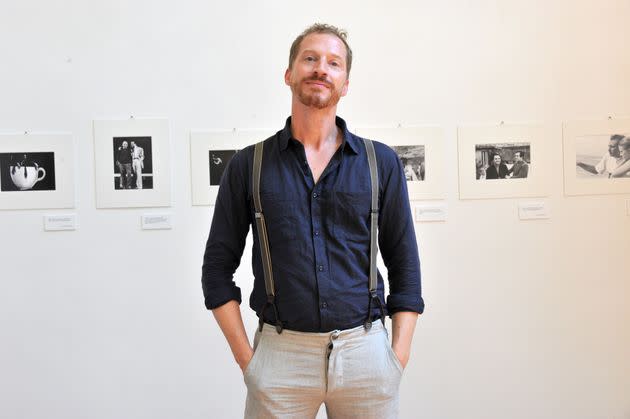Andrew Sean Greer’s ‘Less Is Lost’ Is A Quirky, Queer Road Trip Through A Divided America

Andrew Sean Greer unveiled his new novel, "Less Is Lost," in September. (Photo: Civitella Ranieri)
Andrew Sean Greer’s breakout novel, “Less,” was seen by many as an anomaly when it won the Pulitzer Prize in 2018. The author himself has admitted he didn’t think “Less,” equal parts globetrotting satire and gay love story, would be seen as lofty enough for such a major literary award.
Greer’s assessment aside, “Less” was a joyous, all-encompassing read that captured the transformative power of travel. It followed “minor American novelist” Arthur Less who, on the cusp of turning 50, sets off through Mexico, Europe, Africa and Asia to avoid attending an ex-boyfriend’s wedding.
That hapless hero returns in “Less is Lost,” Greer’s newly released sequel. The novel picks up with Less and his aforementioned ex, Freddy Pelu, having resumed a steady, if staid, relationship. Their calamity is shattered, however, when the death of a loved one prompts Less to cobble together a road trip across the U.S., on which he accepts a series of one-off, literary-adjacent gigs to cover 10 years of back rent on his San Francisco home — and salvage his self-respect and relationship in the process.
“Less is Lost,” unveiled last month, is Greer’s way of grappling with a politically divided America. The book is partly inspired by the author’s own six-week R.V. trek across the American South, which he planned shortly after Donald Trump won the presidency in 2016.
“The last book was about love and growing old,” said Greer, who splits his time between San Francisco and Milan, Italy. “This one is about finding oneself and one’s place in the country ― more existential.”
HuffPost spoke with Greer over Zoom as he was preparing to embark on a book tour. In a candid chat, the author shared the impetus for revisiting the world of Arthur Less and his hopes for the future of LGBTQ representation in literature — as well as Madonna’s now-defunct plans to adapt one of his books as a movie.
“Less” was a complete narrative with a very satisfying conclusion. What made you want to continue the story of Arthur Less in “Less is Lost”?
I wanted to write about a road trip in the U.S. I spent three weeks in the Southwest and three weeks in the Deep South, and I wrote 100 pages, and it was really bad. That’s not uncommon with me. It means I’ve got the wrong way in, and I struggled with it for months.
I just thought: “I wish I already had a ridiculous protagonist, a great narrator who could lovingly chide him, and an elderly character who would be grumpy but meaningful.” And then I was like: “Why am I doing this to myself? I have these characters!” That narrative style was a great way for me to get at things that are hard with a sense of humor. It was a relief to get to go back.

HuffPost spoke with Greer over Zoom as he was preparing to embark on a book tour. (Photo: San Francisco Chronicle/Hearst Newspapers via Getty Images via Getty Images)
You’ve mentioned that the 2016 presidential election is what prompted you to embark on that road trip. Yet “Less is Lost” is not overtly political.
My political opinions are very left, and I can get really angry. But anger is not my best mode as a person or as a writer. I wish it were. I wish I were a good ranter and opinion writer, but I just don’t have that talent.
My rule for “Less” was that I never made fun of the people in the country he was in, so I kept that rule for the sequel. The joke is always on Less — he’s the one out of place. So that relieved me of the pressure to express my opinions.
What have you learned most about America and yourself during your time on the road?
We often think, “Oh, everybody flees their small town and goes to the big city,” but that’s not always true. You can come out [as LGBTQ], and there might be a place for you even if you don’t want to live in New York. You might have to make compromises, but this isn’t the 1980s. That was really interesting to me and [alleviated] my own prejudices about that.
I was outside of the Grand Canyon, and there was a young Navajo man sewing dresses for drag queens. This is as remote as you could imagine. And it just made me think; I’m not even aware of what’s going on. That’s something that’s happening that is not my experience, and that really interests me. I like being wrong, which I always am.
You split your time between California and Italy. How has your time abroad impacted your stance on U.S. culture as a whole?
When I’m in America, my friends get really mad about Marjorie Taylor Greene, but when I’m in Italy, she doesn’t make the headlines because she’s nobody. She has no power except in our heads, which is where she wants it. Italy has its own right-wingers that they write and worry about.
Also, it’s humbling to live in a second language. Sometimes it’s exciting; a lot of times, it’s lonely. Having that experience gives me a sense of what it must be like for all the people in America who are speaking English as a second language, and it takes away some of the arrogance of being an American.
Madonna reportedly acquired the film rights to your 2013 novel, “The Impossible Lives of Greta Wells,” several years ago. What’s the status of the movie adaptation?
Like many things in Hollywood, it fell apart. I get a lot of calls from Hollywood where nothing happens. She’s the one who got the closest. She’s a very energetic, hardworking person. She was really serious about it, but it’s all about getting the money. If something isn’t working, she moves on to the next. But I have to say: I never thought I’d be on the phone with Madonna, hearing her tell me that she loved my work. That was something else.

"I’d love queer authors to feel liberated to write any story they want, and I want to see publishers finding them," said Greer. (Photo: Camilla Morandi - Corbis via Getty Images)
How do you feel the literary world stands to improve in terms of LGBTQ representation moving forward?
I’d love queer authors to feel liberated to write any story they want, and I want to see publishers finding them. I think we have a responsibility to our community to think carefully about the characters we write. I just think we can do more. I don’t want to see another gay male writer publish a novel without any women because that isn’t the world I recognize.
The most exciting writing I’m reading isn’t coming from white authors; it’s coming from writers like Juliàn Delgado Lopera, who writes partly in Spanish and partly in English. And as a writer, that’s what I respond to — a new and energetic way of telling a story.
Are there aspects of the queer experience you’re hoping to explore in future works?
I’m not interested in writing an urban white gay male story because we have a lot of great ones. My next book is set in Italy. Italy’s experience of queerness is very different. In the U.S., everyone is publicly like, “Yes, gay marriage!” But privately, they can be jerks. It’s kind of the reverse in Italy — in private, being gay is totally OK, but in public, absolutely not. So I try to think about that.
If “Less is Lost” is successful, can we look forward to an Arthur Less trilogy?
It’s such a fun way for me to write, so it’s impossible I’ll give it up. I’m going to leave it as a treat for myself when I’m out of ideas. We’ll see.
This interview has been lightly edited and condensed for clarity and length.
This article originally appeared on HuffPost and has been updated.

 Yahoo Movies
Yahoo Movies 